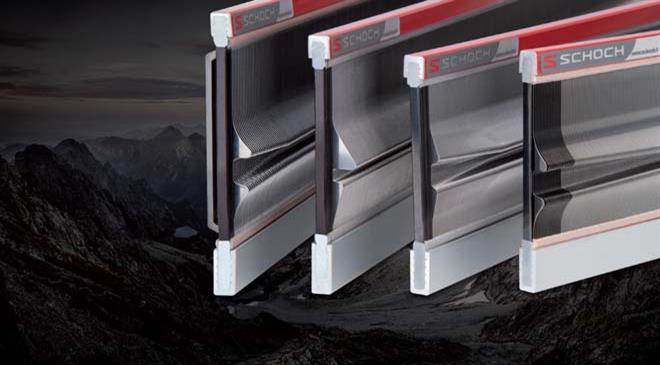Focus on technical textiles is set to increase
Since 1907, Italy's Schoch & Co has stood for efficiency in the production of high-quality weaving reeds for textile looms. The company inaugurated a plant in Kolhapur, Maharashtra, in 2009, which works side by side with the historic headquarters in Italy. Matteo Schoch, CEO and Chairman at Schoch Reeds India Pvt Ltd discusses the highs and lows of the weaving sector in India.
What is the size of the market of weaving machines? What is the growth rate?
In India, there are around 60,000 air jet and the same amount of rapier machines. There are approximate 50,000 old conventional powerlooms still holding their market share in the weaving sector. In the last four years, the annual growth rate of the weaving machine market has increased to around 20 per cent.
Which are your big markets for air jet reeds, flat reeds, terry reeds, and waterjet reeds?
For us, definitely air jet reeds are our biggest market.
Which major events do you plan to participate in 2017-18?
We are participating at SIMA to be held in November and at ITMACH in December.
Which major sectors/areas need immediate government immediate intervention?
In my opinion, the policy on the prices of raw material like cotton, yarn, fabric, etc, in every sector of the textiles industry needs immediate intervention from the government. Nowadays, it is controlled by some groups, and instability in raw material prices makes the textiles market very volatile.
As a private enterprise, what is the kind of governmental help that will advance growth in your field?
Taxation on textile products is a very sensitive issue. The government should take long-term steps to control the final product cost in the market. May be import or domestic taxes. Those will definitely push the growth strategy for private enterprises like ours.
What is the collaborative deal with which you have entered the Indian market?
In 2015, we made an agreement with LGL electronics, Italy, for the sales and service segment in India. They are world class manufacturers of all type of feeders for the weaving and knitting industry.
What steps do you take to ensure that quality of the product line does not suffer?
We follow the TQM system to ensure the quality of the product. In every process we have checkpoints, and we follow the international ISO standards.
Which factors will have a major impact on the industry's performance in the years to come?
Small-scale industries in textiles adopting advanced technologies, cost reduction in present manufacturing set-ups, and improving product quality will have a big impact.
How do you see the Indian textile industry evolve in terms of technology by 2020?
A lot of development happened in the last four years in textiles technology which has revolutionised the market. In the coming years, the focus on technical textiles and specialty products will increase, which have huge potential to grow by 2020.
Which markets does the manufacturing unit in India cater to? What are the future plans?
We target almost all weaving units to be our market potential in India. Our manufacturing unit in India caters to all parts and states of India like Maharashtra, Gujarat, Madhya Pradesh, Tamil Nadu, Andhra Pradesh, Karnataka, Delhi, Punjab, and Rajasthan. Irrespective of its size, every weaving unit is important for us as reed is an integral part of a weaving machine. We are also OEM suppliers for the ITEMA weaving machines. We also cater to countries like Bangladesh, Vietnam, China and Mauritius. In future, we plan to target export markets like Thailand and Indonesia.
Do you manufacture your own ancillaries or are their smaller independent units that you outsource this work to? Is it in the organised or unorganised market?
To control quality and ensure timely delivery, we manufacture everything in-house.
What is the rate at which your company is growing? What is the target set for the next two years?
Our company has been growing at 20 per cent every year since its inception in 2009 in India. Considering the growth in the weaving sector, we aim to increase it by 25 per cent every year till 2020.

How do you deal with paucity of skilled personnel in your segment?
We train our people at our headquarters in Italy, and improve their skills at regular intervals every year.
What are the latest trends and innovations dominating this industry?
Energy saving in air jet reeds is the latest trend dominating this industry.
What are the after-sale services provided by Schoch?
We are the only reed-making company in India which offers after-sales service to customers. This is our USP that sets us apart from other reed-manufacturing companies. We do offer services like reed reconditioning, air audits, energy-saving reed services, ultrasonic cleaning, and airflow recalibration.(HO)
India missed out on a golden opportunity post the phasing out of Quotas in early 2000. Once again some more doorways have opened for India what with rising cost of labour in China specifically and other issues elsewhere. What are the top 3-5points that India and the industry collectively need to take so that we don't miss out on the opportunity again?
We must be independent in terms of raw material resources and should promote indigenous infrastructure. The skilled labour must be trained more to achieve professional attitude towards their work. The taxation structure must be simple and same all over the country.


